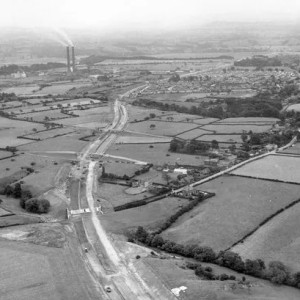The UK’s first motorway had strict rules but no speed limit

Now part of the M6, the Preston Bypass opened in 1958
Lee Grimsditch[1] Nostalgia Writer and Olivia Baron Senior Live News Reporter16:33, 30 Aug 2025
 An aerial view of the Preston by-pass, the first of Britain's gigantic new motorways
An aerial view of the Preston by-pass, the first of Britain's gigantic new motorways
The M6 - the UK's longest motorway and part of the network known as the 'Backbone of Britain' - has its roots firmly planted in Lancashire.
Stretching over 230 miles, the motorway[2] extends from the Midlands to the Scottish borders, passing through Coventry, Birmingham, Wolverhampton, Stoke-on-Trent, Preston, Lancaster[3] and Carlisle.
The first segment of the colossal motorway was laid in Preston.
The Preston Bypass, the UK's first motorway, was constructed to establish a north-south motorway network that would eventually become part of the M6.
While it doesn't run directly through Manchester, it's a key route for accessing the city, with Manchester connected to the M6 via the M62[4] and M56 motorways.
Prime Minister Harold Macmillan officially opened the bypass on December 5, 1958. He was the first person in Britain to travel on a motorway as a passenger in an Austin Sheerline limousine.
Hundreds of spectators gathered near the interchange in Salmesbury to witness this historic event.
Love Greater Manchester's past? Sign up to our nostalgia newsletter here[5]
Conceived as a solution to alleviate traffic jams and congestion on the A6 in Preston, the bypass was viewed as a trial for future motorway construction.
 Prime Minister Harold Macmillan's car leads the first vehicles along Britain's first motorway, the Preston By-Pass. December 5, 1958
Prime Minister Harold Macmillan's car leads the first vehicles along Britain's first motorway, the Preston By-Pass. December 5, 1958
Lancashire County Council surveyor James Drake designed and engineered the eight-and-a-quarter-mile section, which cost nearly GBPm, Lancs Live previously reported[6].
The Preston Bypass Official Opening booklet outlined its ambitions for Britain's first motorway, declaring: "The opening of the Preston Bypass marks the beginning of a new era of motoring in Britain. It is the first link in the network of motorways, which, progressively completed, will contribute to an increasing extent to the health of the community and to the national economy.
"The national motorways in general and the Preston Bypass in particular are designed to enable traffic to travel safely at high speeds, and to minimise the chance of accidents arising from bad driving."
 A59 exit sign on the newly built Preston Bypass. December 1, 1958(Image: Mirrorpix)
A59 exit sign on the newly built Preston Bypass. December 1, 1958(Image: Mirrorpix)
The booklet outlined several strict measures to realise these goals, including banning pedestrians, animals, and cyclists from motorways.
Other measures included junctions allowing motorists to merge with or exit traffic flows, eliminating kerbs while incorporating 'hard shoulders' for emergency use, installing skid-resistant carriageway surfaces, and erecting signage legible day and night without requiring drivers to reduce speed.
Join the Manchester Evening News WhatsApp group HERE[7]
Initially, two north and south carriageways were constructed on the bypass, extending around Preston's eastern perimeter from Broughton to Bamber Bridge.
 Signage, on the A59, the new Preston By-pass, outlining what wasn't allowed on the motorway. December 1, 1958(Image: Mirrorpix)
Signage, on the A59, the new Preston By-pass, outlining what wasn't allowed on the motorway. December 1, 1958(Image: Mirrorpix)
Extra lanes were subsequently added to create what is today known as the M6.
Originally, the design was intended to accommodate vehicles travelling at speeds of 70mph, but no speed limit was enforced for the first few years.
However, during its early operation, drivers reported feeling uneasy about using the bypass because they feared being overtaken by faster drivers. Average speeds were recorded at around 38 mph.
The road was also deliberately built not to be a long stretch of straight road, but to include bridges and trees, to prevent driver boredom, as reported on foreign motorways.
 Preston Bypass, Lancashire, 1958(Image: Getty Images)
Preston Bypass, Lancashire, 1958(Image: Getty Images)
An additional third lane was added in each direction in 1966, but the bypass underwent its most significant change in the 1990s when it needed to be completely rebuilt to become four lanes in each direction.
Article continues belowThis meant all bridges needed to be removed to install a hard shoulder.
A year after the Preston Bypass was opened, the M1 was fully completed, becoming Britain's first full-length motorway in 1959.
However, Lancashire still holds the title of home of Britain's first ever section of motorway, the Preston Bypass.
Six decades later, Britain has over 2,300 miles of motorways.
References
- ^ Lee Grimsditch (www.manchestereveningnews.co.uk)
- ^ motorway (www.manchestereveningnews.co.uk)
- ^ Preston, Lancaster (www.manchestereveningnews.co.uk)
- ^ M62 (www.manchestereveningnews.co.uk)
- ^ here (data.reachplc.com)
- ^ Lancs Live previously reported (www.lancs.live)
- ^ HERE (chat.whatsapp.com)